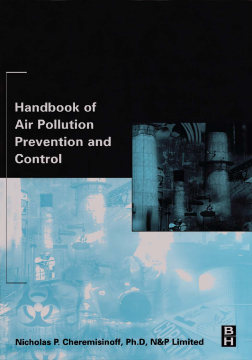
Additional Information
Book Details
Abstract
The Handbook of Air Pollution Prevention and Control provides a concise overview of the latest technologies for managing industrial air pollution in petrochemical, oil and gas, and allied industries. Detailed material on equipment selection, sizing, and troubleshooting operations is provided along with practical design methodology. Unique to this volume are discussions and information on energy-efficient technologies and approaches to implementing environmental cost accounting measures. Included in the text are sidebar discussions, questions for thinking and discussing, recommended resources for the reader (including Web sites), and a comprehensive glossary. The Handbook of Air Pollution Prevention and Control also includes free access to US EPA's air dispersion model SCREEN3. Detailed examples on the application of this important software to analyzing air dispersion from industrial processes and point sources are provided in the Handbook, along with approaches to applying this important tool in developing approaches to pollution prevention and in selecting control technologies.
By applying SCREEN3, along with the examples given in the Handbook, the user can: evaluate the impact of processes and operations to air quality, and apply the model to assess emergency scenarios to help in planning, to develop environmental impact assessments, to select pollution control technologies, and to develop strategies for pollution prevention. Two companion books by Cheremisinoff are available: Handbook of Water and Wastewater Treatment Technologies, and Handbook of Solid Waste Management and Waste Minimization Technologies.
- Uniquely combines prevention and control concepts while covering the practices and technologies that are applied to the prevention of air pollution in the chemicals manufacturing, oil and gas, iron and steel, and pharmaceutical industries, and to the cleaning and control of industrial air emissions.
- Provides a bridge for today's environmental manager by focusing on an integrated approach to managing air pollution problems within industrial operations.
- Shows you how to calculate financial returns from pollution prevention projects.
...provides an overview of the latest technologies for managing industrial air pollution in petrochemical, oil and gas, and allied industries. It offers information on equipment selection, sizing and troubleshooting operations as well as discussions on energy-efficient technologies and approaches to implementing environmental cost-accounting measures.
-Safety + Health/July 2002
